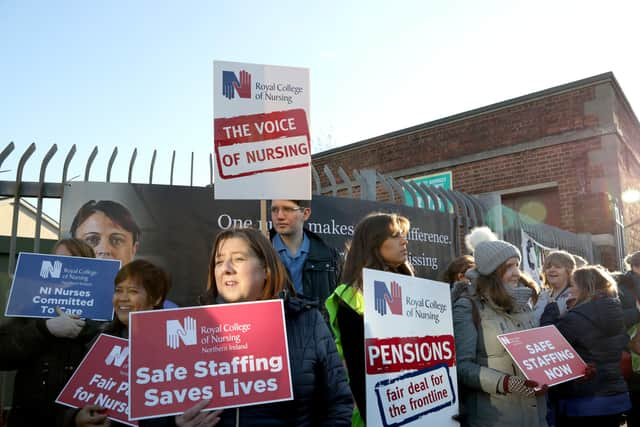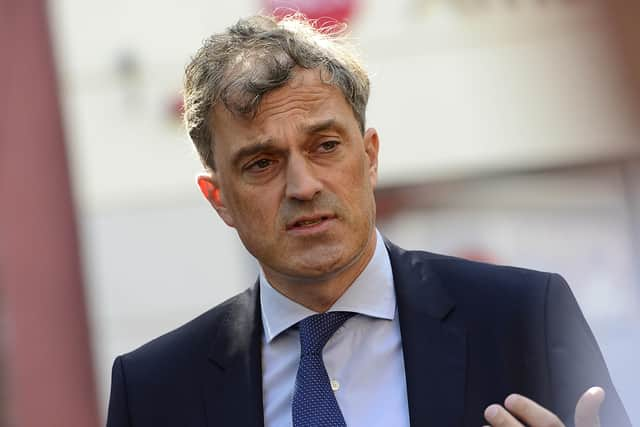Health crisis: Julian Smith under growing pressure to intervene
and live on Freeview channel 276
Despite his protestations that health remains a devolved issue and is therefore not his responsibility, serving and former senior NHS figures spoke out to say that Mr Smith now needs to get involved.
Last night the secretary of state gave no hint that he will relent and consider moving towards even limited direct rule for the Department of Health.
Advertisement
Hide AdAdvertisement
Hide AdThe News Letter asked a series of questions of Mr Smith – including whether he was prepared to consider introducing direct rule until Stormont can be restored, if that is possible, if it is clear that lives are at stake.


In response, Mr Smith’s department, the NIO, insisted that “health is a devolved matter” and “only a restored Executive has the powers to take decisions on the health service. The government never announced legislation on direct rule”.
The NIO said that Mr Smith was “very concerned about the current situation in the health service in Northern Ireland and has had further discussions with the NI Civil Service today, but has no powers to direct them or take decisions on health matters”.
Last week it was confirmed that more than 133,000 patients are waiting more than a year for hospital treatment and more than 300,000 people are waiting to see a consultant.
Advertisement
Hide AdAdvertisement
Hide AdThe Royal College of Surgeons last week warned bluntly that “Northern Ireland’s healthcare system is at the point of collapse”.


That crisis has escalated with industrial action, including strikes, by health staff over pay and staffing levels which unions say are unsafe – but the issues cannot be addressed without either a direct rule or devolved minister to take decisions.
Last night it emerged that the action – which led to more than 10,000 outpatient appointments, including some for cancer diagnosis and surgery being cancelled – has led to confusion, with many other appointments being missed.
John Compton, the former chief executive of the Health and Social Care Board, yesterday told Radio Ulster’s Talkback programme: “In the absence of an Executive, then there’s a secretary of state and I think you have a situation today where for the first time there is going to be effectively a general strike on the 18th; there are already many thousands of people being disrupted with the anxiety that causes for them.
Advertisement
Hide AdAdvertisement
Hide Ad“I can’t quite see how that sort of pressure doesn’t involve the secretary of state. That’s the political reality of today. We might all like to have a local Executive, but we don’t. But we do have a secretary of state.”
He added: “This is a political decision and the only political entity we have at this moment in time is the secretary of state. It really incumbent on the political system to respond to what is a growing and a really quite unpleasant set of circumstances.”
Dr Tony Stephens, chief executive of the Northern Health and Social Care Trust, told the Nolan Show that the NHS was now dealing with two unions taking action and he thought it would end up with four or five unions taking industrial action.
He said that if action planned for next week goes ahead it could have a “very significant impact on Causeway Hospital’s ability to function as normal”.
Advertisement
Hide AdAdvertisement
Hide AdHe added: “In the middle of an election and during purdah, it would be unwise for me as a public servant to tell the secretary of state what to do.
“But clearly, as far as I can see, it ends up at his door now.”
When Mr Smith’s claim that it was a devolved matter was put to Dr Stephens, he said: “Well, we don’t have a devolved administration.”
Last night the union Unison said that its 10,000 nursing members “intend to see this campaign for pay justice through to the end. They will join their colleagues and the nurses in the RCN on December 18 on a major day of action across the health service”.
Advertisement
Hide AdAdvertisement
Hide AdWhen asked on Talkback why, amidst a health crisis, the word health only appears once in Sinn Fein’s general election manifesto, Sinn Fein’s northern leader – and Stormont’s last health minister – Michelle O’Neill said: “What it tells us is that this election is about Brexit.”
She appeared to indicate that one of Sinn Fein’s red lines for restoring Stormont will now be another “huge financial injection” from London.